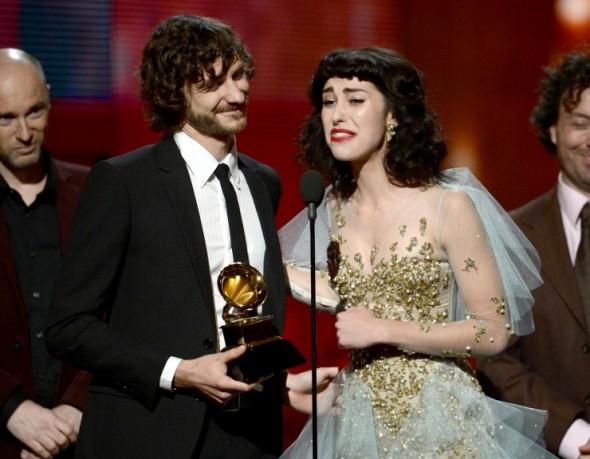Blog
Mental Silence Meditation
Mental Stillness – 5 Minute Meditation from Lene Jeffrey on Vimeo.
Posted in Music Therapy | Tagged Meditation, mental silence | Leave a commentGrammy award for William!
Today was a very special day – we met to celebrate and watch our friend William Bowden – a nominee for this years Grammy award for Record of the Year. He was nominated for his work as mastering engineer on Gotye’s album and song Somebody That I Used to Know. Gotye specifically chose William’s sound engineering skills for this album, and we were all extremely elated to see William up there receiving his award with Gotye and Kimbra. I had just been telling my friends about a particularly incredible performance that Prince had done at another award ceremony, and lo and behold, there was Prince presenting the award for Record of the Year. We are all extremely happy for William – a very proud moment and here’s to the wonderful creative flair and sensitivity of Australian musicians and artists!
If in fact you like Gotye’s song as much as I do, here is a great rendition done by a wonderful group of music therapists and one ukulele – If you want to know more about music therapy, this performance will explain it in a fabulous musical way:
Posted in Music Therapy | 1 CommentThe wisdom of the body – somatic awareness
Many wise men and women through the ages have said that all the answers lie within our selves, in other words within our own physical bodies – that we can in fact access our OWN truth from within ourselves. Having spent quite a lot of time studying body-psychotherapeutic approaches, I know that the proponents of such methods for self awareness will agree strongly. In the east it is well accepted that our truth has to come from within. Having been a meditator of more than 26 years I know this to be very much the case. When connecting with my inner being and raising my awareness beyond the physical and mental part of my being, I have experienced becoming connected with a higher awareness and an intuitive wisdom which is boundless.
I observed earlier today, as I often marvel when having my morning shower, that somehow I get my best intuitive messages for the day ahead, during the process of taking a shower (other than of course my morning meditation, which is the failsafe method). I’ve always observed this to be the case, and if something particular has to be dealt with on that day, it will come to me during this time. It still amazes me that it is always the right message, which works out to be of great benefit. I don’t do anything to encourage this process – it just happens. Again this happened to me this morning, and I thought about it. Whilst showering we naturally bring our attention towards our physical body and away from our tendency to purely be active in the head and active within our thinking processes. So our awareness is very much bodily during this time. It made me conclude that if indeed we have all the answers useful to ourselves inside our own being, naturally these should come to us when bringing our attention inwards and towards our entire physical form (and not just the brain).
For increased wellness in this day and age, we need to encourage the processes that make us far more connected with our WHOLE body. Nature, meditation, massage does it for me – many activities have this therapeutic effect for everyone individually. As Sir Ken Robinson has famously said, we live in our heads so much that the body is ‘just a transportive vehicle for getting our head to the next meeting’! Food for thought, and for me a great inspiration for increasing my somatic awareness! I admire all those who seek to demonstrate to the rest of the word that there is a complete interconnectedness of all parts of our being, in a time when we are moving further towards the polarisation of all parts of our existence, and the dislocation of the mind from the body. If the only intelligence we have is located in the area of the brain, where does common expressions such as ‘gut feeling‘ and ‘broken heart‘ come from? Here’s to the brilliance of that feminine power called as intuition – It comes from within and it always works for me.
Posted in Psychology | 2 Comments
A baby’s cry pitched down
My son alerted me to a the fascinating sound of a baby’s cry pitched down to a male adults voice. Listen here:
The sound of this crying appears quite bizarre, weird and even disturbing. That is because at the same time as sounding primal it sounds really ‘adult’. So although this crying is the expression of an infant who has not yet developed language, we perceive the sounds as coming from a mature adult. This presents a dichotomy.
It made me think of how the opposite can also be true. Last week I sang some songs for an adolescent client, who is severely disabled by a crippling condition. Lying in a bed helpless like a baby, this could easily make us perceive him as being at a kind of infant stage of development – certainly he is extremely dependent on others no doubt. I sang a few soothing lullaby-type songs for him, because he appeared to be in a quite restless state. This did not seem to change his disposition in any way, so I decided to sing a contemporary pop song to him more loudly and in a upbeat tempo. During the song I could sense very subtly that his face was lighting up and towards the end of the song his mouth beamed me a huge and beautiful smile. It was quite clear that he loved this style of music. This little event reinforced for me how important it is to use age-appropriate musical material in working with all our clients. Noone should never ever dumb down people just because they may be incapacitated, but aim higher and know that any 15-year-old may naturally be inclined to the types of music his contemporaries enjoy – at the right point in therapy of course. We are all humans travelling through the same life-stage developments.
Also, the information we deduct in communication with others, comes from a set of information we perceive, where either the words, pitch or even the silence between the words may become the predominant informant. Words, and even the the lack thereof, is only one small ingredient out of all the combined mechanisms (such as pitch, intonation, body language and facial expression) that make up our communication with each other!
What is music therapy — or what it is not!
Music therapy is not music teaching, although planned goals in music therapy can at times induce the acquisition of musical skills – (these are not desired outcomes but rather a positive by-product). The following fictitious vignette illustrates a scenario similar to that which is oftentimes encountered in music therapy and seeks to illustrate the difference between music teaching and music therapy.
I am lending a supportive rhythm and chordal background to my client’s non-verbal vocalisations. Tim is ‘singing’ the seemingly non-sensical words of a song he is creating, and I am trying to match his pitch with my guitar chords. I am also trying to sense the level of intensity and pace of his song, so that I can musically re-enforce and support the emotion he is expressing. I echo his vocalizations back to him at opportune moments, and repeat some of the structures he has created, in order to solidify a kind of chorus. Tim is looking increasingly excitedly at me, especially when I echo his ‘chorus’ – he is intensely and enthusiastically engaged, making solid eye contact with me. Tim is clearly enjoying in the moment.
If the above was an example of music education, the assessment of what just happened could go along the lines of: ‘Tim is not staying within his pitch and his melody is moving randomly all over the place – it needs more structure and coherence. He is unable to maintain a solid pace and rhythm, and is not following the strumming of the guitar totally. Tim is not establishing and securing the themes of his song, and appears exited and somewhat distracted by his phrases being repeated by the music teacher. He needs to develop more structure to his singing and become more coherent in tempo and pitch, so that he can create meaningful music – Must try harder’.
In music therapy assessment what is happening here is: In his own free improvisational style Tim is communicating and expressing of himself, albeit non-verbally. The music is inspiring and encouraging Tim to verbalize and express vocally and melodiously something of his world and of himself. He is communicating and connecting with another person via the music making. He is making eye contact with someone other than his parents, and he is demonstrating clear enthusiasm, safety and enjoyment partaking in the musical activity. Tim is being creative, not in the usual aesthetically pleasing sense, but he is creating his own song which has meaning for him. Tim is clearly feeling supported and heard. His family reports that he is always less anxious and much calmer after his music therapy session, making it much easier to care for him.
Tim is on the Autism Spectrum. He does not speak and has serious impairments in his ability to communicate with and understand others, and as a result his social functioning is severely affected. He feels safe with very few people, and does not make eye contact with anyone except for his immediate family. Due to the isolation of his closed world he often experiences frustration. Musical interaction, such as this improvisational collaboration, is a process whereby he can express of himself to others in a non-verbal, yet efficacious and meaningful way.
In music education, the desired goals are musical, whereas in music therapy the goals are non-musical – in this illustration the goals being: Psychosocial well-being, socialisation and anxiety reduction.
Music therapy is provided by highly trained and qualified practitioners, who use clinical and evidence-based music interventions. Music therapist’s professional practice is overseen by a governing body — in Australia ‘The Australian Music Therapy Association – AMTA’.
Posted in Music Therapy | Leave a comment
